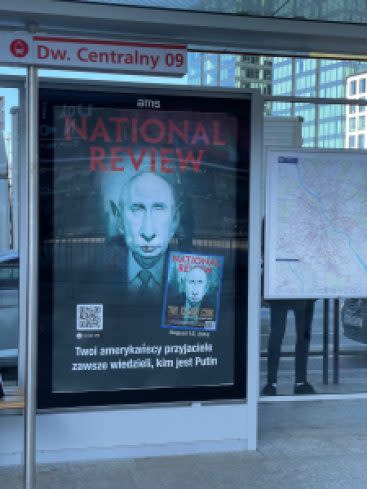NR Unveils ‘Bloody Czar’ Billboards in Poland Showcasing Longstanding Opposition to Putin

- Oops!Something went wrong.Please try again later.
National Review has unveiled a series of billboards around Warsaw, Poland, letting the Polish people know that the magazine has long been an open critic of Russian dictator Vladimir Putin.
“Your American friends have always known what Putin is,” the ads say in Polish.

The billboards, along with a series of ads posted in bus and train stations, feature an August 2016 National Review magazine cover story by David Satter called, “The Bloody Czar.” The street-level ads include a QR Code that links readers to the article.

Satter wrote at the time, “I believe that Vladimir Putin came to power as the result of an act of terror committed against his own people.”
The evidence is overwhelming that the apartment-house bombings in 1999 in Moscow, Buinaksk, and Volgodonsk, which provided a pretext for the second Chechen war and catapulted Putin into the presidency, were carried out by the Russian Federal Security Service (FSB). Yet, to this day, an indifferent world has made little attempt to grasp the significance of what was the greatest political provocation since the burning of the Reichstag.
I have been trying to call attention to the facts behind the bombings since 1999. I consider this a moral obligation, because ignoring the fact that a man in charge of the world’s largest nuclear arsenal came to power through an act of terror is highly dangerous in itself.
Satter wrote that there were near immediate doubts about the origin of the bombings, suspicions that only deepened when a fifth bomb was discovered in the basement of a building in Ryazan. That bomb was ultimately found to have been placed by agents of the FSB. After the agents were arrested by local police, the head of the FSB said the bomb was fake and had been planted as part of a training exercise, Satter wrote. Yet the bomb test positive for hexogen, the explosive used in the four successful apartment bombings.
The cover story details the investigations and allegations that then transpired. Those “capable of helping to make the bombings a serious political issue were disappearing one by one,” Satter wrote, detailing a series of untimely deaths and imprisonments.
The circumstantial evidence that the bombings were carried out by the FSB is overwhelming. The only reason there is no direct evidence is that the Putin regime has concealed it. In the case of the Ryazan incident, the authorities have sequestered the persons who put the bomb in the basement, the records of the exercise, and the dummy bomb itself. They putatively did this to protect state secrets, but, according to Russian law, among the things that cannot be considered state secrets are facts about “catastrophes threatening the security and health of the citizens” and “violations of the law by state organs and officials.”
The greatest barrier to accepting the evidence that points to the FSB as the perpetrator of the bombings is sheer reluctance to believe that such a thing could be possible. By any standard, murdering hundreds of innocent and randomly chosen fellow citizens in order to hold on to power is an example of cynicism that cannot be comprehended in a normal human context. But it is fully consistent with the Communist inheritance of Russia and with the kind of country that Russia has become.
The 2016 story is useful context on how Putin operates now that all eyes are on the Russian invasion of Ukraine.

Putin announced on February 24 that his government had resolved “to launch a special military operation” aimed at the “demilitarization and denazification of Ukraine.”
President Biden said weeks after the invasion began that Putin is a “war criminal” for his attacks on Ukraine. White House press secretary Jen Psaki later explained that Biden was “speaking from his heart and speaking from what we’ve seen on television, which is barbaric actions by a brutal dictator through his invasion of a foreign country.”
“There is a legal process that continues to be underway at the State Department. That’s a process that they would have any updates on,” she added.
Biden condemned Russia’s bombing of “apartment buildings, maternity wards, hospitals” and other civilian targets after Ukrainian officials said Russian forces bombed a theater in Mariupol where hundreds of people had taken shelter.
The International Criminal Court first opened an investigation into allegations of Russian war crimes during the first days of the invasion. At the time, Ukraine said Russia was shelling civilian areas and had exploited the definition of “genocide” as a pretense to invade.

